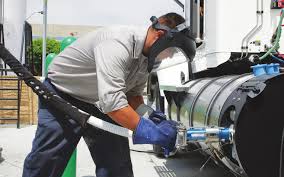While Cleantech projects typically scare off traditional startup seed VC funds because of the amount of money needed, it is always interesting to see what kinds of ideas government money is being thrown at.
According to The Funding Portal Blog, a Varennes, Quebec-based cleantech project aiming to convert urban waste into cellulosic ethanol, reducing greenhouse gas emissions, has secured up to $39.8 million in funding from Sustainable Development Technology Canada’s (SDTC) NextGen Biofuels Fund.
“Our government is investing in advanced clean energy technologies that create well-paying jobs and generate economic opportunities,” said Natural Resources Minister Joe Oliver. “By supporting innovative projects like Vanerco’s, we are helping Canadian companies develop an idea into a marketable reality.”
The Vanerco Varennes-Generation Project is a joint venture between Enerkem Technologies, a Montreal-based waste-to-biofuels and chemicals company, and GreenField, a leader in ethanol production. The project already secured initial funds of $734,500 from SDTC, but the funding could grow to several million dollars based on project milestones going forward.
The project will unfold in Varennes (just outside of the Montreal island), and it aims to convert 100,000 metric tonnes of urban waste per year into 38 million litres of cellulosic ethanol, which can be used for transportation fuel.
“This project truly puts industrial waste to work, creating jobs in the community while producing as much as 38 million litres of ethanol a year. SDTC is proud to be a partner in this pioneering project,” said the SDTC’s Vicky Sharp. “Getting technologies such as this to a commercial scale will be crucial in helping Canada play a key role in the dynamic global cleantech marketplace, currently valued at $1 trillion.”
SDTC’s NextGen Biofuels Fund aims to bridge the funding gap for emerging cellulosic ethanol and biodiesel technologies. These technologies often present higher levels of risk than more established industries, making it a challenge to secure financing from risk-adverse lenders and creating a financial barrier to investment in development and demonstration. SDTC provides repayable funding for such projects and also assists to scale-up technology solutions to large, demonstration-scale plants.
While the fund is open to cellulosic ethanol and new biodiesel technologies in near full or full-scale production plants, starch-based (first-generation) biofuels technology and commercially-proven biodiesel production processes are not eligible.
Applications are accepted on an ongoing basis, and approved projects must be completed in six years or less. The repayment period extends 10 years after the conclusion of the project.
Economic Action Plan 2013 will provide $325 million over eight years to Sustainable Development Technology Canada to support the development and demonstration of new clean technologies. “We support Canadian companies that are researching and developing workable solutions to sustain our environment for future generations while balancing our need for responsible resource development,” said Minister of Infrastructure, Communities and Intergovernmental Affairs Denis Label.
The SDTC is a not-for-profit foundation that finances and supports the development of clean technologies, which provide solutions to issues of climate change, clean air, water quality and soil, and which are said to deliver economic, environmental and health benefits to Canadians.
It operates two funds: The SD Tech Fund supports projects that address climate change, air quality, clean water, and clean soil, while The NextGen Biofuels Fund supports the establishment of first-of-kind large demonstration-scale facilities for the production of next-generation renewable fuels.


